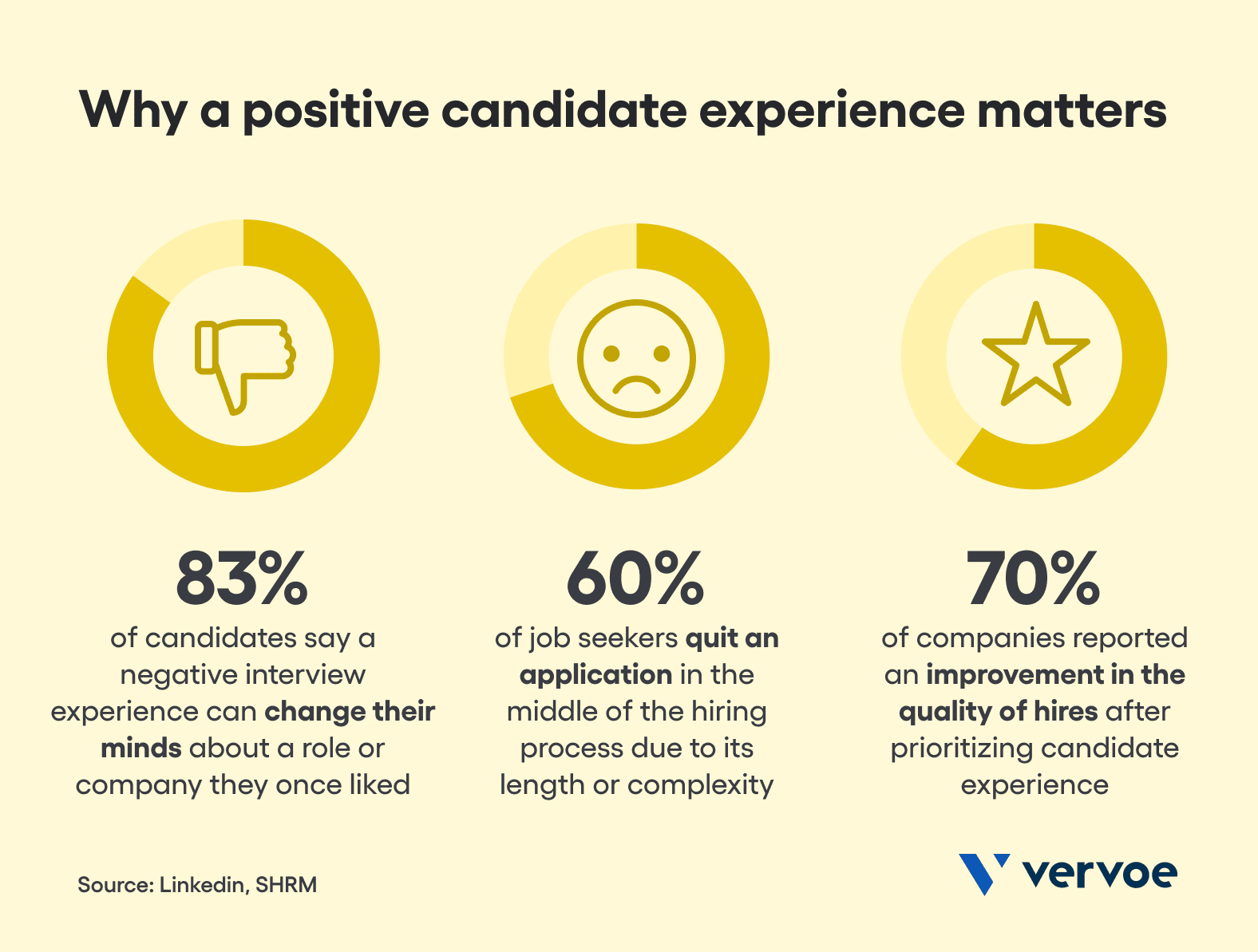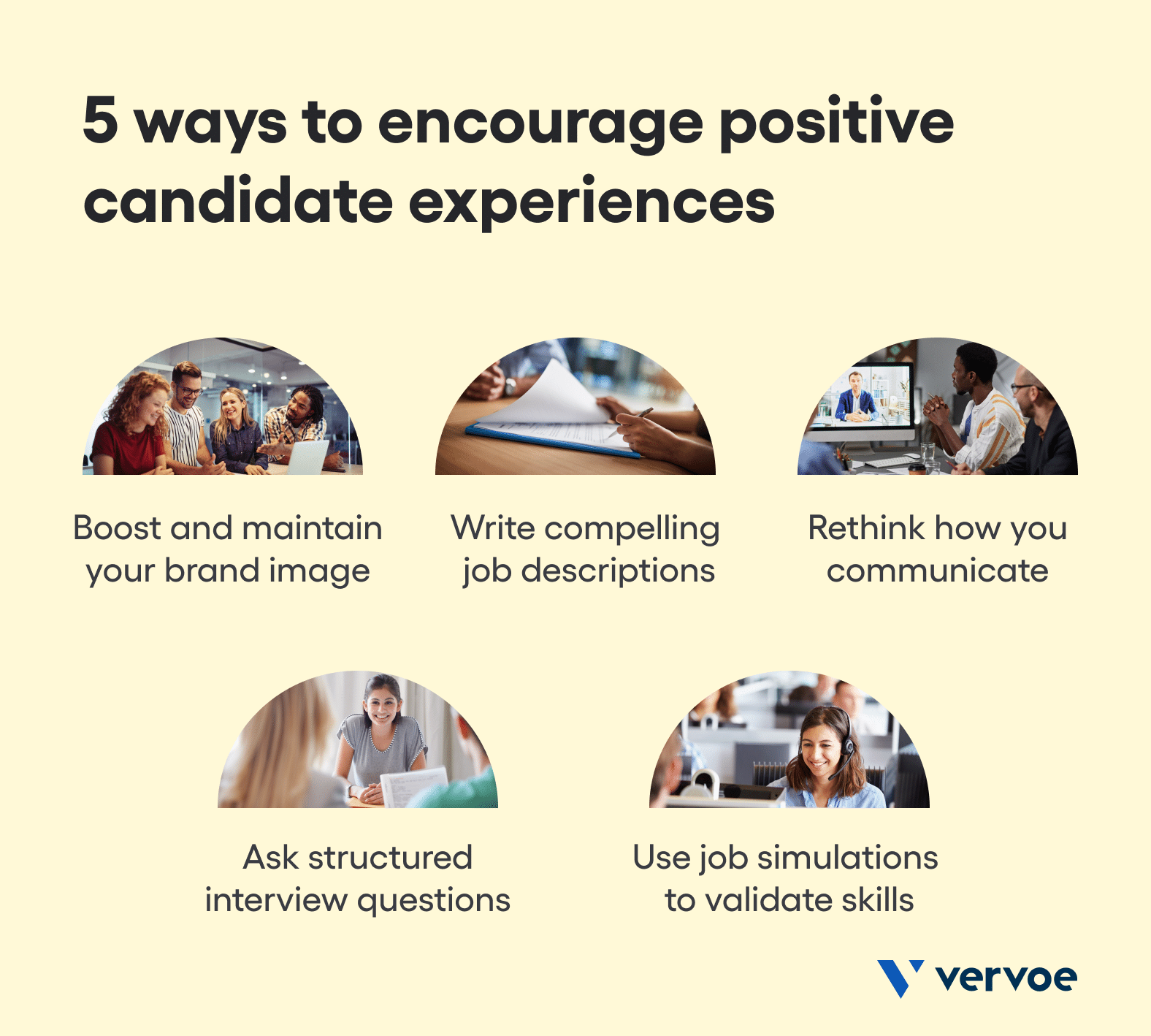Every hiring manager has their own preferred set of recruitment strategies, but are there any in particular that are proven to enhance candidate interviews?
A recruiting strategy is a term we use to describe a plan of action, or the steps required to attract, engage, onboard, and retain candidates for open opportunities within a business or organization. Without one, a hiring manager is effectively going in blind.
Rather than advertising a role and hoping that you receive the right applicants, recruitment strategies can help you avoid the alternative: a lengthy, costly, and poorly received hiring process. Unfortunately, little thought is usually given to the candidates on the receiving end of the experience.
Why a positive candidate experience matters
Like it or not, the world of recruitment is increasingly candidate-led. Once upon a time, employers could put a decent salary on the table, and expect that it would be enough to attract top-quality employees — and for a time, it was.
Today, job seekers simply have higher expectations. The decision to apply, interview for and ultimately accept a position is based on a broad range of factors, including the impression they receive of your company throughout the hiring process. What’s more, is that the results can have wide-reaching consequences for the company in question — and now there’s data to prove it.
In fact, companies who aimed to develop a positive candidate hiring experience reported a 70% improvement in the quality of hires, meaning that they are more likely to be satisfied within their role, loyal to the organization, and more productive with better performance results.
In contrast, 83% of candidates say a negative interview experience can change their minds about a role or company they once liked, and something as little as providing consistent communication and following basic etiquette can significantly influence a candidate’s opinion about your organization.
It’s also worth remembering the power of review platforms such as Glassdoor, as a poor interview experience is all it takes for someone to leave their feedback publicly, and potentially damage your organization’s reputation.
Interestingly, it’s not just the manner and approach of a recruiter that can drive candidates away, as 60% of job seekers quit an application in the middle due to its length or complexity. Talented candidates have plenty of choices in the job market, and they won’t jump through hoops that they don’t need to.
What this data tells us is that not only do positive experiences matter but their scope goes far beyond your company’s approach to a face-to-face candidate interview. If effective recruitment strategies start from the moment a prospective candidate sees your advertisement, how do you get it right?

Which employee recruitment strategies will improve the hiring process?
Once upon a time, there were five key performance indicators (KPIs) used to measure the effectiveness and efficiency of a recruiter. These metrics included the time taken to fill a vacancy, cost per hire, the applicant-to-interview ratio, offer acceptance rate, and quality of hire. Today, there’s now a sixth: candidate experience.
Given that candidate experience is a newer performance metric, it’s understandable that it leaves many hiring managers stumped on identifying recruitment strategies that will enhance it. Thankfully, there are five relatively easy options to implement for this purpose.
1. Boost your brand image
Like it or not, your brand’s image and reputation influence how customers, employees, and stakeholders perceive your company. In a tight labor market, applicants now have the luxury of being more selective about whether a brand’s image and culture align with their personal values. Therefore, it’s unsurprising that 82% of people consider employer brand and reputation before applying for a job, a 7% increase in the past five years.
Candidates will be looking at your website, reviews, and social media before submitting their applications and resumes — especially Millennials and Gen Zers. In most cases, LinkedIn is generally the best place to reach potential candidates, as this professional networking platform not only provides opportunities to showcase the nature of the work conducted at your organization but what your workplace culture is all about.
2. Compelling job descriptions
Writing an attention-grabbing, accurate, and compelling job description is crucial to engaging with qualified candidates. In fact, companies should be treating candidates like potential customers — readers want more than the basics, and need to feel compelled to take action. Try making your job descriptions as straightforward and professional as possible, finding the right balance of being serious, friendly, and informative.
While captivating company statements, core responsibilities, and promoting staff benefits are basic best practices, how you present your organization’s values has never mattered more. In fact, 67% of candidates value a more empathetic tone in diversity, equity, and inclusion (DEI) statements. Be bold, and avoid being generic about topics that have the potential to resonate with candidates on an emotional level.
3. Rethink communication channels
Is there anything more infuriating than being ghosted by a company after you’ve had a job interview? Despite almost every applicant unanimously feeling the same on this topic, just 42% of employers reach out to declined candidates. Not only does this risk a potentially nasty Glassdoor review, but these companies are also unwittingly eliminating these applicants from future opportunities.
A good candidate experience requires clear communication both before and after an interview. Set your candidates up for success by letting them know who they will be talking to ahead of time and what they can expect to be discussed. By opting for this approach, you’re not only displaying that your company values the time of candidates, but you’re preparing them with as much information as you can prior to the interview.
4. Ask better interview questions
There was once a time when employers could legally ask candidates just about anything — personal and otherwise — during the hiring process. Rightly so, new laws and societal norms mean that this problematic approach isn’t as dominant as it once was. But interview questions asked by hiring managers still have a long way to go when it comes to their contribution towards fostering a positive candidate experience.
Unfortunately, our ability to judge someone’s character, personality, or skill by a short conversation is poor. Not all people perform well in these environments, so try to avoid creating a situation that feels like an interrogation. As an example, put the candidate at ease by asking open-ended questions, maintaining eye contact, and getting a better understanding of specific projects or skills they have that directly relate to the job.
5. Use work simulations
While still a necessary evil in many companies, most job interviews are unstructured and prove to be unreliable, and fail to predict actual employee performance. Therefore, it shouldn’t come as a surprise to learn that candidates would rather be judged on what they can do instead of how they interview, with 74% of candidates looking for opportunities to present their knowledge and skills during the hiring process.
Work simulations are on the rise as one of the key recruitment strategies of the future thanks to their ability to empower recruiters to hire with confidence, while simultaneously improving candidate experiences. Also known as job simulations, this form of skills testing is designed to “simulate” a day on the job, providing candidates with a chance to show what they can do without the potential for human bias from recruiters during the hiring process.
Ultimately, effective recruitment strategies benefit both candidates and hiring managers alike. As a whopping 58% of job seekers had declined a job offer due to poor experience, recruiters who prioritize this during the hiring process have a competitive advantage. The question is not if you can afford to improve the experience your job applicants receive from your company, but if you can afford not to.

How Vervoe is reinventing recruitment strategies
Vervoe is an end-to-end AI-powered solution that is proudly revolutionizing the hiring process through skills testing, job simulations, and machine learning recruitment. By empowering businesses to create tailored assessments designed to suit the specific requirements of a role, Vervoe predicts performance using job simulations that showcase the talent of every candidate.
We know that finding global talent is only getting more difficult, which is why assessing true candidate skills via job simulations has been embraced as a tool to enhance candidate experiences while simultaneously streamlining the workload of recruiters.
By assessing an applicant’s ability to perform the role through a skills assessment, our job simulations focus on the work — and not the person. To see people do the job before they get the job, book a demo today and let our experienced team run you through Vervoe’s full range of ready-made and tailored solutions.


















